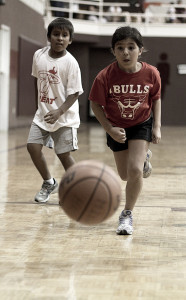Thinking about Safety at Basketball Training
Safety should be at the forefront of any coach’s mind when preparing for a training session. No matter the sport, one of the elements of training that a coach cannot get away from is always having the safety of players, staff, and parents as their highest priority.
For a coach the role of safety officer starts from the moment they arrive at the venue for training. A coach might not be accountable for the venue and its surrounds, but because of the nature of coaching always being on the lookout for issues or potential problems is just part of the role. It does not matter if you are coaching the tiny tots or an elite professional basketball team, at all stages you must be constantly vigilant.

When moving into the venue if there are any obvious problems you should look to pass on this information to management. In many cases near misses or minor accidents turn into significant problems because people to do not report what they see. As a coach always have the best interest of your team and community at heart and report any issues you encounter. As an example, many venues sometimes struggle with poor (or blown) lighting in areas around venues such as car parks. If you notice any lights blow or not in proper working order report this so the venues management. This can only benefit your team when training at dusk or night time.
Before starting practice, be sure to inspect the court and immediate areas for possible problems. One of the most common issues facing teams is liquids split on the surface of the court and not being identified until a player slips during a training session. Take some time to have a look at the surface of the floor to ensure it is free from hazards and is safe to starting training on.
Be sure to ask your players not to stretch by sitting on the court. Your players should be stretching off the court in the out of bounds areas so if they are sweating this does not leave residual dampness of the floor where the training session will be held. Preventative awareness like this will go a long way in limiting the chance of issues happening and improving safety overall.
Additionally, when providing a drink break for your players or if they grab a quick drink during activities ask them to do so off the court. Water bottles should never come onto the court at any stage during training. This only increases the chance of liquids being spilt on the court and again causing possible problems. Even if a spillage is identified early, the time lost during training cleaning up this issue can be frustrating.
To help with the ongoing issue of sweat and water on the court towels need to be provided. These can be given to Assistant Coaches or Team Managers if you are lucky enough to have the support staff. However, if you do not have the luxury of additional staff in addition to the Head Coach then you will need to be aware of this problem and make sure you supply these items. Most venues will not supply items such as towels but they are necessary. Every coach has experienced a situation where someone has slipped on court and the issue this has caused when trying to remove the sweat from the floor if no towel is available.
Other common issues experienced by teams during training sessions can include:
- Roof leaking during heavy rain
- Chewing gum or other foreign substances on court
- Court slippery during humid or overly cold weather
- Run off around court not adequate in areas
- Equipment around the side of a court (indoor soccer goals for example)
- Uneven surfaces or loose flooring materials
As a coach, you will need to be prepared to deal with a number of situations. Always take some time to think about how you can eliminate or limit safely the impact of a hazard if possible and never feel rushed or pressured to make a decision on what action to take. At the end of the day, you are the Coach and always need to make the right decision concerning each and every individual that takes part in your program with regards to safety.







